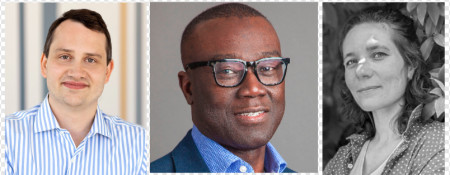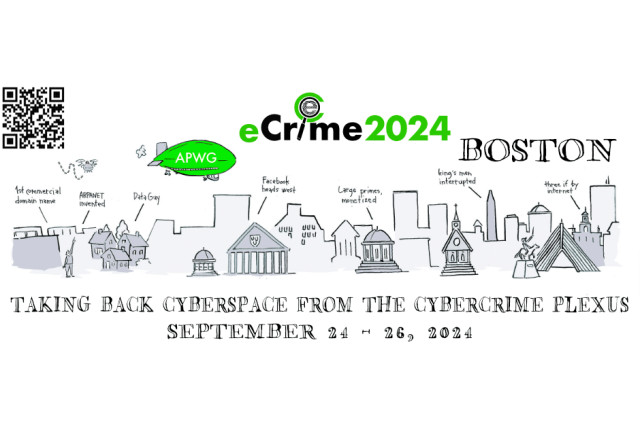Taking Back Cyberspace From the Cybercrime Plexus

CAMBRIDGE, Mass., May 6, 2024 (Newswire.com) - This year's Symposium on Electronic Crime Research (eCrime 2024) in Boston explores the theme of taking back cyberspace from the criminal plexus that has claimed and criminalized so much of the Internet’s infrastructure and fueled new society-scaled threats that are growing by the day.
eCrime 2024 examines the economic foundations, behavioral elements, technological exposures, policy aspects and other dimensions that fuel the burgeoning global, multi-billion-dollar cybercrime plexus, at its peer-reviewed, published 19th annual eCrime symposium on September 24 – 26, 2024.
APWG eCrime 2024 General Chair Laurin Weissinger asks, "Are we on our way to a real-life version of William Gibson novels — or Star Trek-esque future where crime becomes less and less relevant? Either way, we must focus on the here and now, what is actually happening in cybercrime and cyberspace, to shape the future. eCrime is one of the few forums that convenes the mix of people who can actually provide answers to the organizing questions of the age.”
As APWG enters its third decade, the growing threat of cybercrime expands apparently unabated. Our latest quarterly report, yet again, shows the number of phishing attacks in 2024 eclipsed every previous year. Which makes the ideas and insights of industry interveners and researchers more important than ever.
APWG eCrime 2024 combines a peer-reviewed conference for academic researchers with general sessions open to industry, government, law enforcement and multilateral organizations. eCrime features keynote presentations from global thought-leaders, as well as technical and practical operationally focused sessions, and interactive panels.
The objective of eCrime is to foster practical collaboration and the exchange of catalytic ideas by academic researchers, industry security practitioners, and law enforcement professionals in the global struggle against cybercrime.
The symposium’s proceedings are in English.
Students requiring discounts should contact symposium managers at apwg_events@apwg.org.
Please contact the APWG eCrime organizers for details via email at apwg_events@apwg.org.
Proposals for the general sessions should be forwarded directly to the APWG eCrime 2024 organizers at apwg_events@apwg.org.
Submission guidelines for the peer-reviewed Research Papers are as follows below:
FYI for the auld tymers, for research paper submissions, please use the New Submission option at:
IMPORTANT DATES:
Full Paper registration / submission due: June 23
Notification of acceptance: July 7
Conference: Sept 24-26
Camera-ready paper due: October 25
PAPERS´ TOPICS MAY INCLUDE BUT ARE NOT LIMITED TO:
Artificial Intelligence as criminal co-conspirator – and as defensive collaborator
Addressing challenges of cybercrime’s increasing complexity (e.g. digital infrastructures, crime-fighting/forensic techniques, and the structure of the crimes themselves)
Detecting and/or mitigating eCrime (e.g. online fraud, malware, phishing, ransomware, etc.)
Behavioral and psychosocial aspects of cybercrime victimization – and prevention
Measuring and modeling of cybercrime
Economics of cybercrime
Cybercrime payload delivery strategies and countermeasures (e.g. spam, mobile apps, social engineering, etc.)
Public Policy and Law for cybercrime
Cryptocurrency and related cybercrimes – and forensic tools and techniques for cryptocurrency related cybercrimes
Case studies of current cybercrime attack methods, (e.g. phishing, malware, rogue antivirus programs, pharming, crimeware, botnets, and emerging techniques)
Detecting/preventing abuse of internet infrastructure to neutralize cybercrimes
Detecting/isolating cybercrime gangs’ and attendant money laundering enterprises
Cybercrime’s evolution in specific verticals: (e.g. financial services, e-commerce, health, energy & supplies)
Cybercriminal cloaking techniques – and counter-cloaking tools and approaches
Design and evaluation of UI/UXs to neutralize fraud and enhance user security
AUTHORS’ GUIDANCE
eCrime has adopted the IEEE publication format. Submissions should be in English, in PDF format with all fonts embedded, and formatted using the IEEE conference template, which can be found at:
http://www.ieee.org/conferences_events/conferences/publishing/templates.html.
Submissions should be anonymised, excluding author names, affiliations and acknowledgments. Authors’ own work should be referred to in the third person.
Paper should not exceed 12 letter-sized pages, excluding the bibliography and appendices.
Committee members are not required to read appendices, so ensure that the main paper is intelligible without them.
Submitted papers that do not adhere to all the above guidelines may be rejected without consideration of their merits.
Authors of accepted papers must present them and register at the event.
For paper submissions, please use the New Submission option at:
https://ecrime2024.hotcrp.com
Authors will be asked to indicate whether they would like their submissions to be considered for the Best Student Paper Award. Any paper co-authored by a full-time student is eligible for this award.
Authors of accepted papers must guarantee that their paper will be presented at the conference. We understand that some authors may face difficulties in obtaining funding to attend the conference. Therefore, a limited number of stipends are available for those who are unable to secure funding. Students who will present their accepted papers themselves will be given priority in receiving such assistance.
Source: APWG


